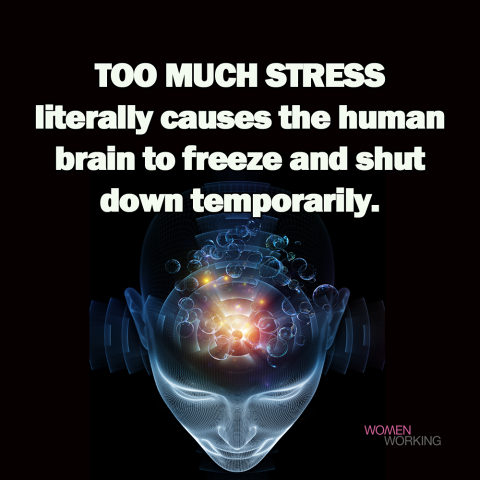

Understanding stress can help us know when and how to take proactive steps to reduce and prevent stress. More stress awareness helps us better care for family, friends and colleagues, as well as ourselves. Here are a few less commonly known stress facts:
Fact #1: Your body doesn’t care if it’s a big stress or a little one.
The human body doesn’t discriminate between a BIG stress or a little one. Regardless of the significance, stress affects the body in predictable ways. A typical stress reaction, which most of us experience dozens of times each day, begins with a cascade of 1,400 biochemical events in your body. If these reactions are left unchecked we age prematurely, our cognitive function is impaired, our energy is drained, and we are robbed of our effectiveness and clarity.
Fact #2: Stress can make smart people do ‘not-so-smart’ things.
Stress causes what brain researchers call “cortical inhibition.” The phenomenon of cortical inhibition helps to explain why smart people do dumb things. Simply said, stress inhibits part of our thinking brain and we can’t function at our best. On the other hand, research shows we can learn how to shift our stress response to create “cortical facilitation” – where we are cognitively sharp, emotionally calm, and we feel and think with enhanced clarity. It’s called shifting into “coherence” where our brain, heart and nervous system are working in harmony. This physiological state of coherence facilitates cognitive functioning and optimal mental, emotional and physical performance.
Fact #3: People can become numb to their stress.
We can be physiologically experiencing stress, yet mentally we think we’re fine because we’ve become accustomed to it. Many of us have become so adapted to the daily pressures, irritations and annoyances of life that it starts to seem normal. Yet the small stresses accumulate quickly, and we may not realize how much they’re impairing our mental and emotional clarity until it shows up as an overreaction or poor decision that we later regret.
Fact #4: We have more control over our emotional stress reactions than we might think.
We don’t need to be victims of our own emotions, thoughts and attitudes. We can become more conscious of how stressful situations are affecting us before they take a toll, mentally, emotionally or physically. There are simple, scientifically validated solutions that can empower us to take charge of stress overload and even rewire our habitual stress reactions.
Fact #5: A most effective strategy is to handle stress in the moment.
The best way to stop stress accumulation is to deal with it the very moment you feel it come up. We can’t always do that with major stressors, but we can shift most stress reactions that we experience throughout a day. Millions of people unsuccessfully try the binge-and-purge approach when it comes to releasing stress. They stress out all day, believing that they can wait until later to recover. They may go to an evening yoga class, the gym, or wait until the weekend to chill out. Unfortunately, our health, productivity and life satisfaction suffer when we put off releasing our stress accumulation.
Research has demonstrated how different emotions change our heart rhythm patterns. Stressful emotions create chaotic, erratic heart rhythm patterns. (See above image)
In contrast, renewing emotions like appreciation, love and care create inner balance and coherent heart rhythms, which look like rolling hills in the image above– a smooth and ordered pattern.
People quickly progress in their personal stress management as they use the heart rhythm technologies that can measure these changes.